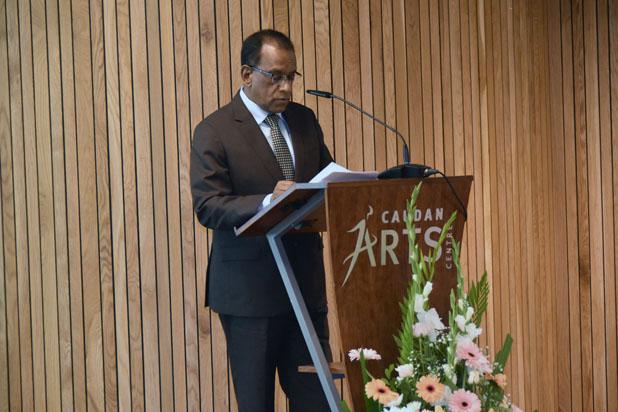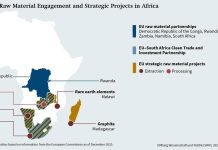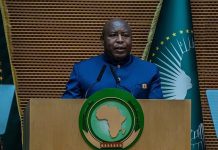Africa-Press – Mauritius. The Women in Trade Protocol under the African Continental Free Trade Area Agreement (AfCFTA) is the focus of a one-day inception workshop held, today, at the Caudan Arts Centre, Port Louis.
The Minister of Industrial Development, SMEs and Cooperatives, Mr Soomilduth Bholah, and the United Nations Development Programme (UNDP) Resident Representative for Mauritius and Seychelles, Ms Amanda K. Serumaga, were present.
The validation workshop is organised by the Ministry of Industrial Development, SMEs and Cooperatives in collaboration with the UNDP, in the context of the national level consultations on the forthcoming Women in Trade Protocol under the AfCFTA.
In his address, Minister Bholah recalled that the AfCFTA, which became operational on 1st January 2021, aims to create a single market and deepen the integration of the African region by providing preferential market access to Member States to facilitate trade and investment.
Such an initiative presents important opportunities for boosting intra-African trade and promoting development that is environmentally, socially and economically sustainable, he said.
He indicated that the AfCFTA is the world’s largest free trade area, providing access to a market of 1.2 billion people and a consolidated GDP of USD 3 trillion, which is expected to more than double by 2050.
Africa, with its rising middle-income class and demand for new products, offers a continent of opportunities to be tapped. The AfCFTA aims to ensure the prevalence of gender-responsive trade ecosystems in line with Sustainable Development Goal 5.
Its aim is to achieve gender equality and empower all women and girls, he added. Minister Bholah underlined that the Women in Trade Protocol under the AfCFTA will be instrumental to boost inclusive trade in the region for Mauritian women entrepreneurs.
He further indicated that in Mauritius, Micro Small and Medium Enterprises (MSMEs) are key players in the economic landscape and contribute to around 35 % of Gross Value Addition, half of new employment created, and around 12% per cent of domestic exports in 2019.
Acknowledging that women have been instrumental in contributing to the socio-economic development of the nation, he however deplored that women-owned businesses represent today only 10 percent of total businesses registered which shows a decline over preceding years.
According to him, women-led SMEs face various challenges, especially start-ups who do not have strong internal competencies to devise and implement effective branding and marketing strategies to access local and regional markets.
The Minister recalled that Government’s strategy is to secure new export markets and offer an array of opportunities for businesses, MSMEs and Cooperatives.
Apart from the AFCFTA, he stated, several agreements have been signed this year, namely the Free Trade Area Agreement between Mauritius and China, the Comprehensive Economic Cooperation and Partnership Agreement with India, the Economic Partnership Agreement between the United Kingdom and the Eastern and Southern Africa community.
We are working with the private sector, industry and SME associations, regional and international organisations to make available information on global market opportunities so as to enable more trade and more exports, he said.
For her part, Ms Serumaga underlined that it is important that women in Mauritius are active participants in the economic landscape of the country. She recalled that Mauritius has different dimensions to trade and different specificities which need to be addressed.
She highlighted that generally, the unemployment rate is higher for women adding that they have less responsibilities in the Trade sectors and also face wage disparities. Hence the need to create a conducive environment and introduce policies that address these gaps, she stated.
Speaking about the AfCFTA, she pointed out that the expectations are high as the Agreement relates to the expanded business prospects for women led business which will unlock the potential for African women to grow their business from micro to macro enterprises.
Through the AfCFTA, informal and micro and small enterprises will be integrated into the continental markets breaking the barriers these businesses constantly encounter as they try to penetrate more advanced regional and overseas markets, she said.
According to her, women who are estimated to account for 70 % of informal cross-border trade in Africa, will be well positioned to tap into regional export destinations and use regional markets as stepping stones for expanding into overseas markets.
By reducing tariffs and with simplified trading regimes for small traders, AfCFTA makes it more affordable for informal traders to operate through formal channels, which offer more protection by addressing the vulnerabilities women in cross-border trade often encounter such as harassment, violence, confiscation of goods and even imprisonment, she added.
Tackling gendered barriers to women’s development through AfCFTA
The AfCFTA has the potential to lift the human development of Africa’s 1.3 billion people on several fronts, namely creating 14 million additional jobs within manufacturing by 2025, increasing wages by at least 10 percent, and reducing poverty by more than 60 percent.
The UNDP has partnered with the Government of Mauritius and the private sector to undertake national consultations on the AfCFTA Protocol on Women in Trade. This engagement is based on a cooperation framework between UNDP’s Regional Bureau for Africa and the AfCFTA Secretariat.
Through this partnership and other consultative platforms, Mauritius can promote opportunities to benefit women through the Trade Protocol by bringing together women entrepreneurs to share experiences on the gendered barriers and challenges to entering the African market, and by consolidating these findings and enabling the formulation of national policy positions to inform the Action Plan of the Mauritius Africa strategy.
For More News And Analysis About Mauritius Follow Africa-Press







